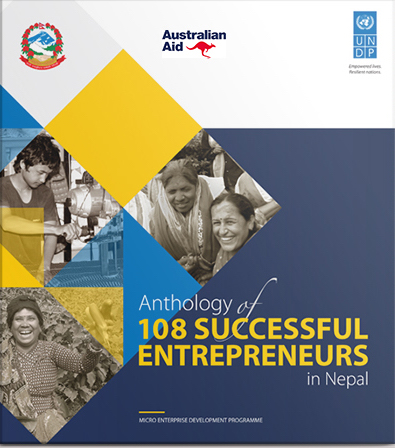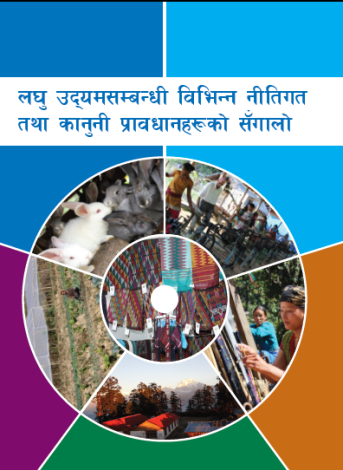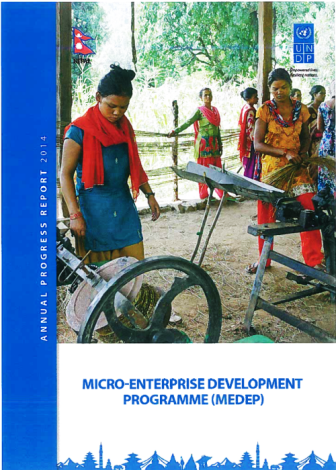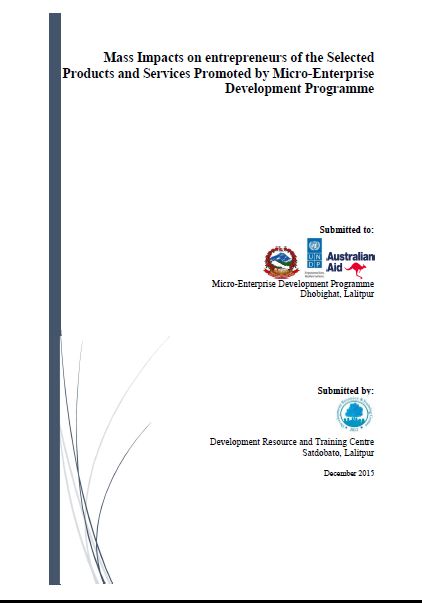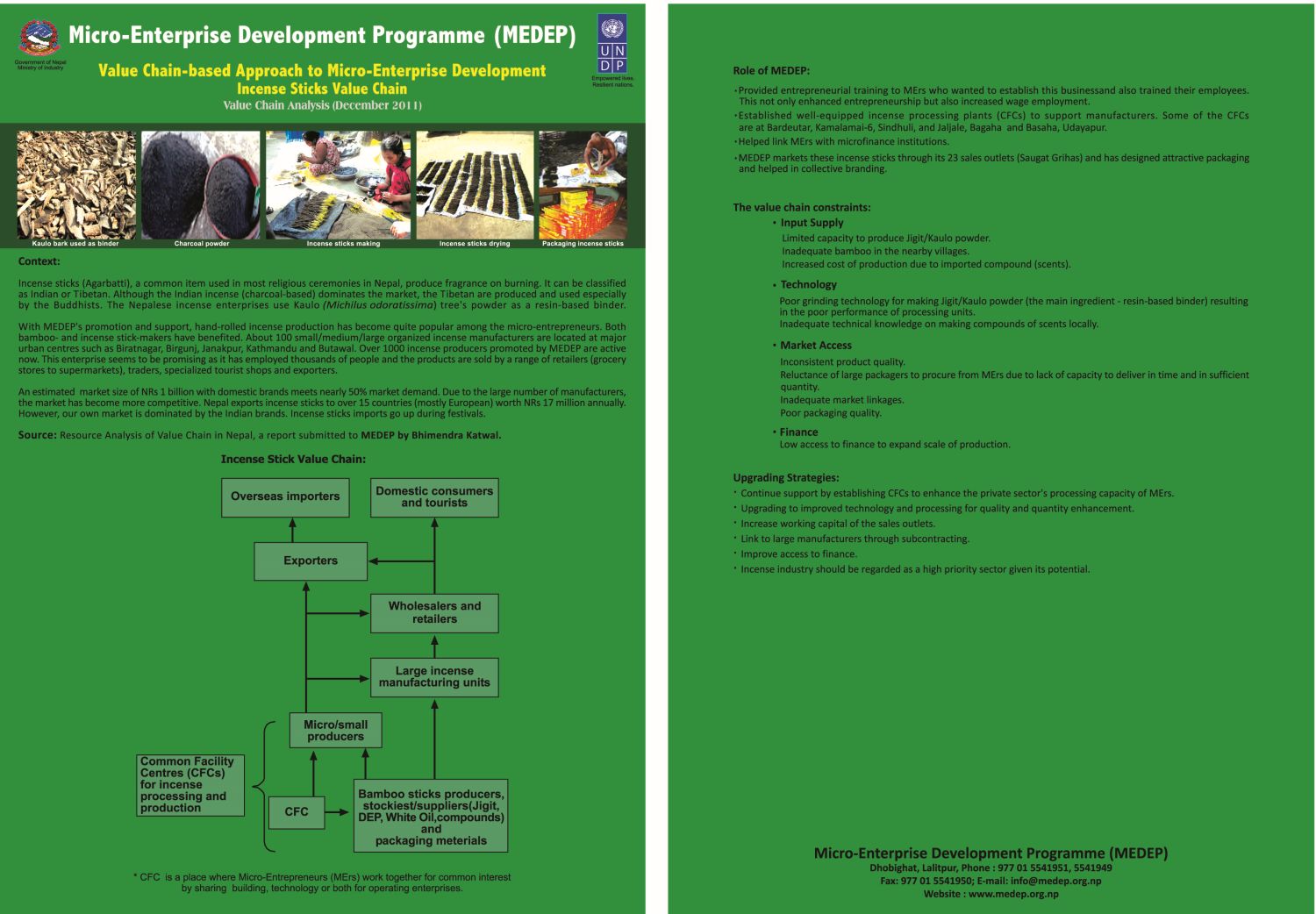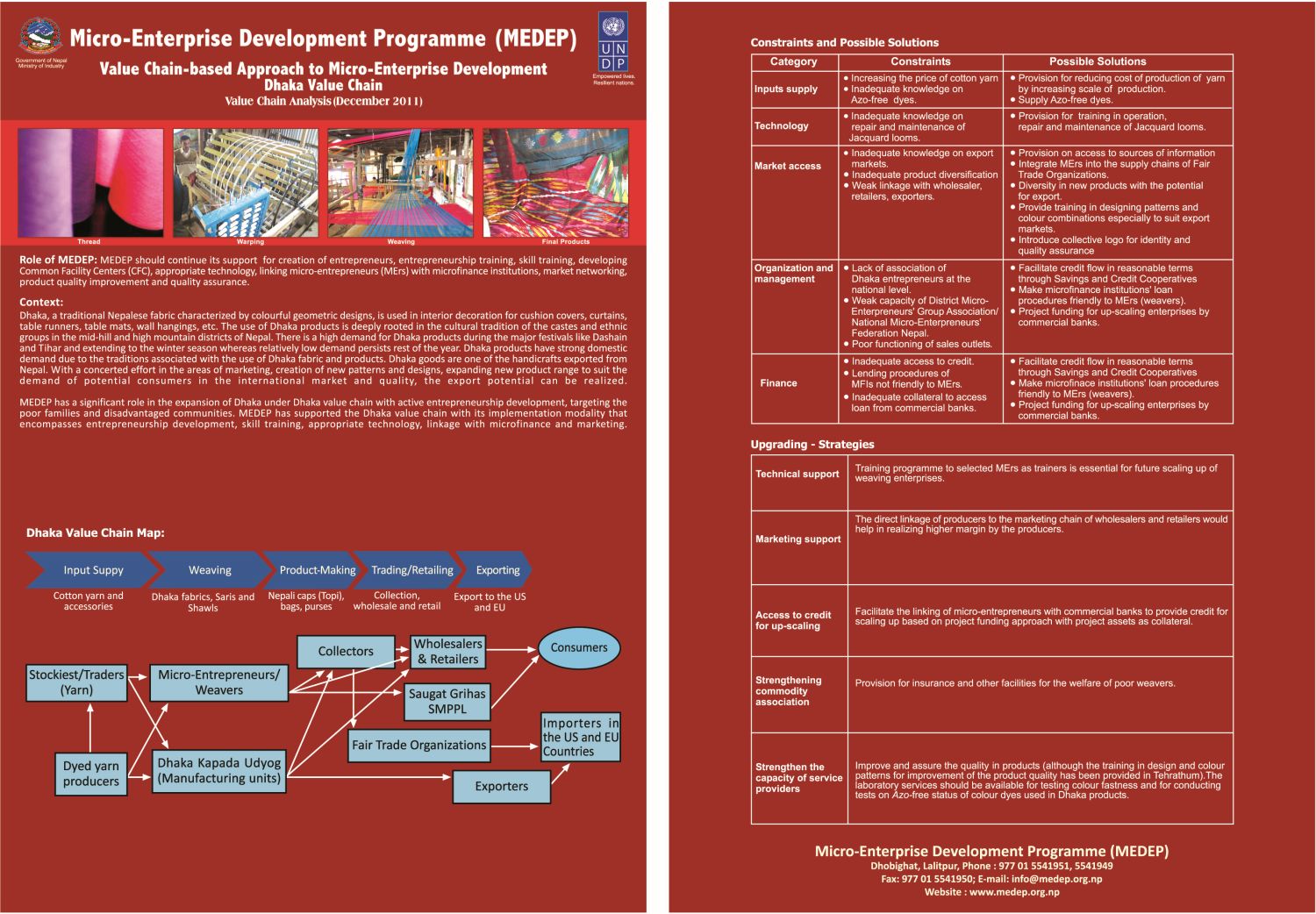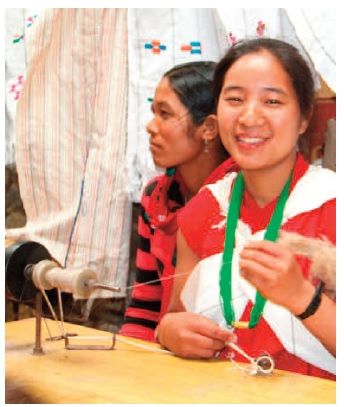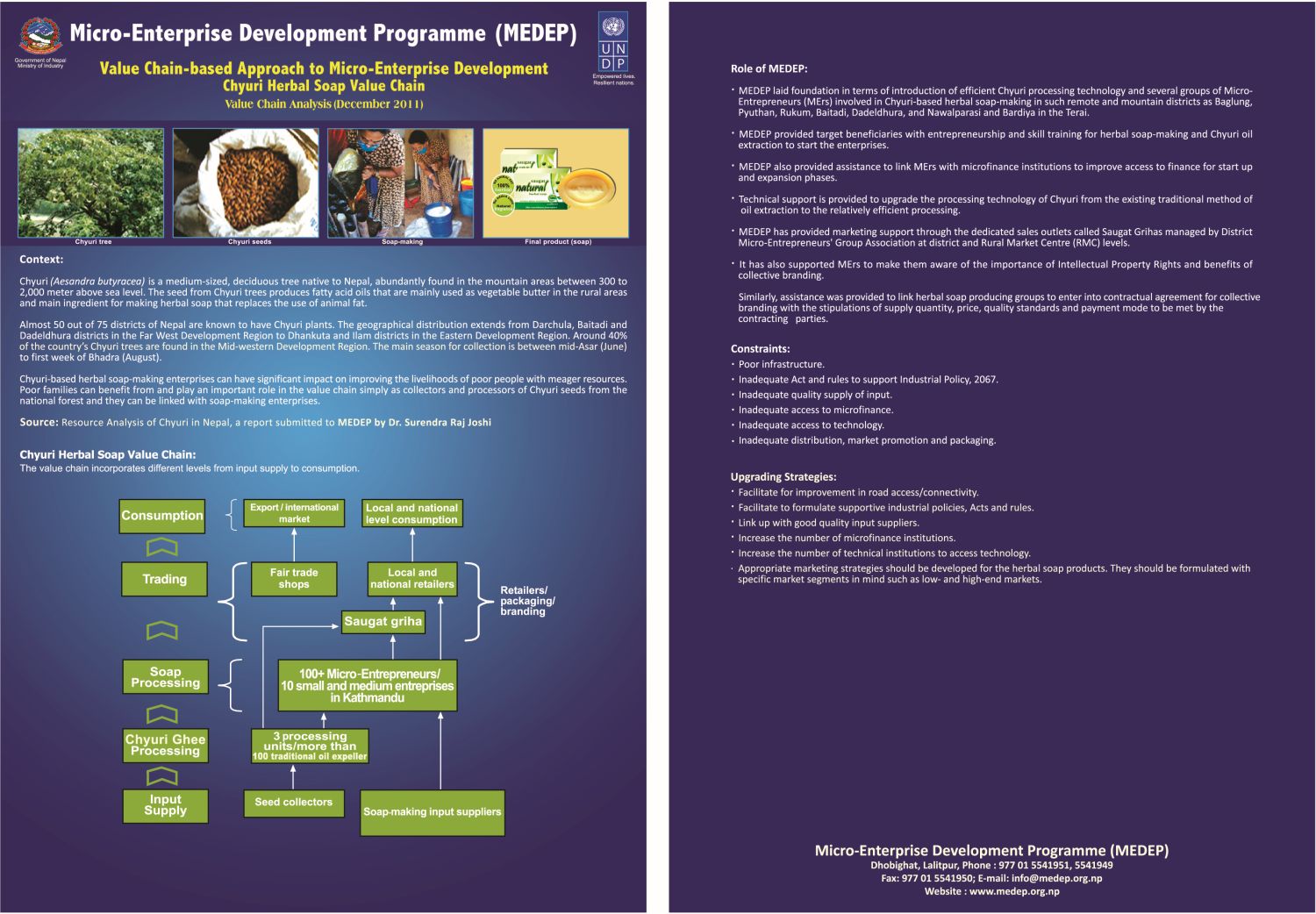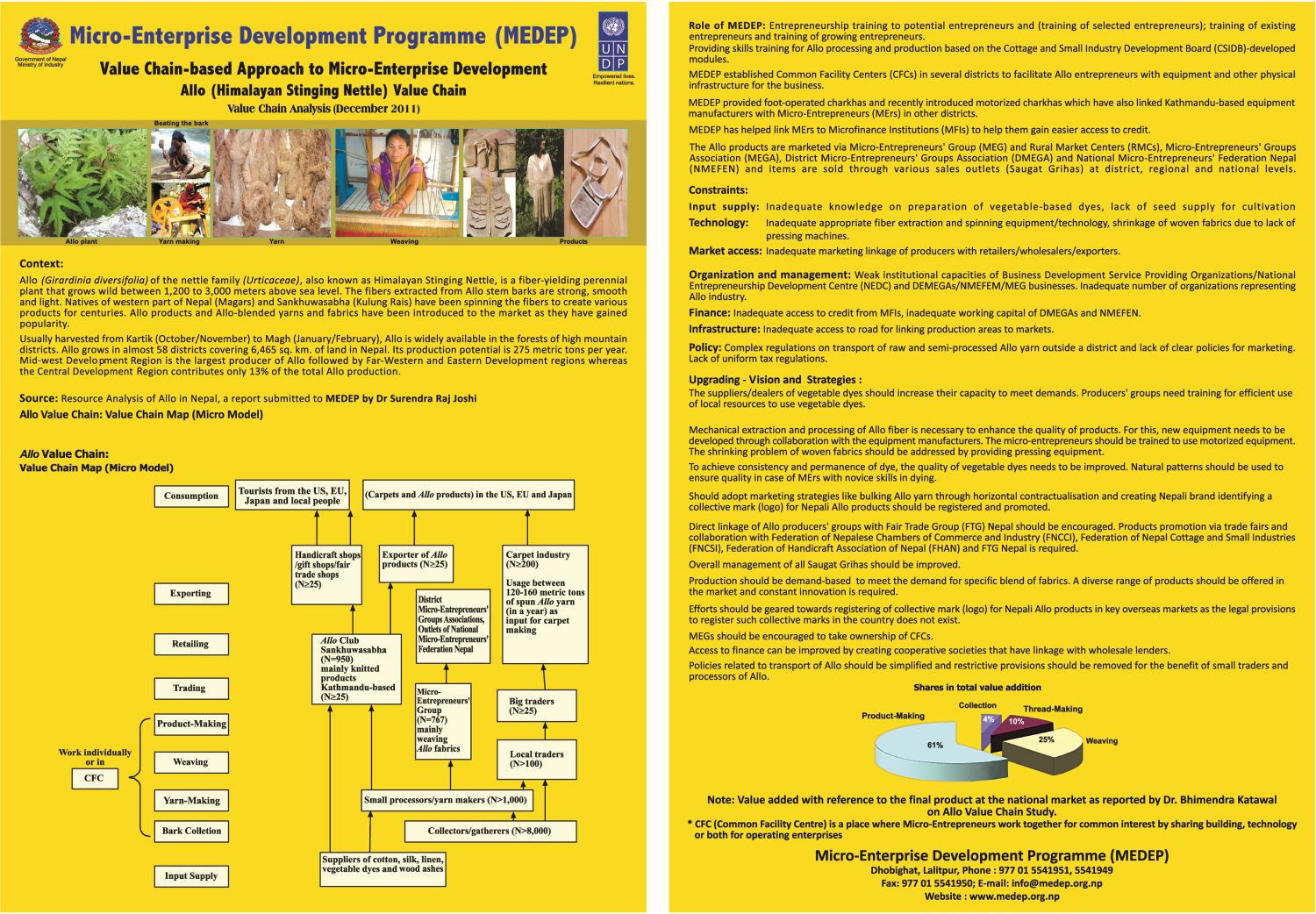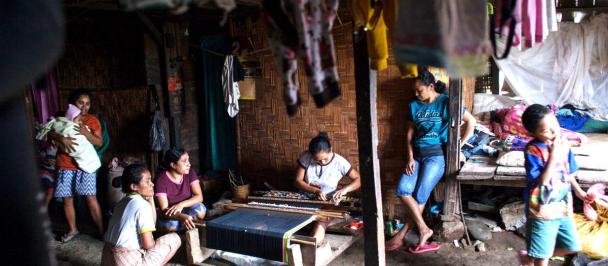[Closed] Micro-Enterprise Development Programme
Micro-Enterprise Development Programme (MEDEP)
Status: | Closed | ||
Duration: | Phase I: 1998 to 2003 | ||
Geographic coverage: | Phase I: 10 districts | ||
Focus area: | Poverty Reduction | ||
Implementing agency: | Ministry of Industry, Commerce and Supplies, Government of Nepal | ||
Implementing partners: | Government: Ministry of Federal Affairs and Local Development, Ministry of Forest and Soil Conversation, Ministry of Agriculture Development, District Coordination Committee (DCC), Local Level Units (LLUs), Cottage and Small Industries Development Board (CSIDB), National Federation of Micro Entrepreneurs Nepal (NMEFEN) and MEs associations, District Cottage and Small Industries Office (DCSIO), District Chamber of Commerce and Industry (DCCI), Industrial Enterprise Development Institute (IEDI), , Business Development Service Providing Organisation (BDSPO), MFI partners – district-wise. | ||
Donors: | Australian Department of Foreign Affairs and Trade (DFAT) | ||
External website: |
Summary
Over eighty percent of Nepal’s population live in rural areas. Inadequate income generating opportunities in these areas have been a major cause of widespread poverty and outflow of productive workforce abroad. With aims to cater the needs of socially excluded groups living below the poverty lines by promoting off-farm employment, the Government of Nepal (GoN) and the UNDP started implementing Micro Enterprise Development Program (MEDEP) in 1998.
Background
Over eighty percent of Nepal’s population live in rural areas. Inadequate income generating opportunities in these areas have been a major cause of widespread poverty and outflow of productive workforce abroad. With aims to cater the needs of socially excluded groups living below the poverty lines by promoting off-farm employment, the Government of Nepal (GoN) and the UNDP started implementing Micro Enterprise Development Program (MEDEP) in 1998. Since then, it has evolved as a model of entrepreneurship development with potentials of lifting thousands of people out of poverty. Targeting the rural poor, women and disadvantaged groups, with successful three phases, MEDEP now is on its fourth phase. On its fourth phase, MEDPA is gradually taking over MEDEP’s role of creating and sustaining entrepreneurs. In turn, MEDEP is more focused towards capacity building of government, line agencies and private organizations for the sustainable delivery of Micro-Enterprise Development services (MED). MEDEP's role will be in developing enabling environment and building institutional capacity of the Ministry of Industry and other partners for the sustainable delivery of MED services thereby contributing for reducing poverty through transferring entrepreneurship development knowledge and skills; creating, promoting, and sustaining micro-enterprises, and generating self-employment and employment opportunities to the rural poor.
MEDEP, jointly implemented by UNDP and Ministry of Industry, Nepal Government is currently funded by Australian Department of Foreign Affairs and Trade (DFAT). MEDEP is creating systems, structures and enabling environment for sustainable development of micro enterprise sector by:
- Supporting the Government of Nepal to implement MEDPA program;
- Building the capacity of the government and the private sector including NGOs (MED service providers) to sustainably deliver Micro Enterprise Development;
- Strengthening the capacity of micro-entrepreneurs associations to sustainably provide members with a number of business development services such as access to markets; access to finance; improved technologies and advocacy.
MEDEP continually works to support uplifting rural poor by motivating them to engage in enterprises. To do so, MEDEP:
- Provides skill and business training and other support, especially for women and poor and disadvantaged people to set up micro-enterprises;
- Assists to establish business support services and representative organizations for micro-entrepreneurs; and
- Works with the government to improve policy environment.
MEDEP’s technical support has led the government to replicate the MEDEP model as Micro Enterprise Development for Poverty Alleviation (MEDPA). The government has been implementing MEDPA since 2010. Currently in 69 districts, the GoN aims to expand it to all 75 districts by 2018. The Cabinet has endorsed MEDPA operational guidelines which lays out a plan for overtaking and expanding MEDEP. To do so, the government will contribute 25% of the total budget (NRS. 4.1 billion) from the government’s Core Fund with a commitment of 67% from the donors and development partners (DFAT/UNDP) and 8% from local bodies. With these resources, the government aims to create 73,000 new micro-entrepreneurs and supporting 60,000 micro entrepreneurs for scale up.
For sustainable development of micro enterprises in Nepal, MEDEP facilitated the approval of a number of national level policy and guidelines. In 2013, the government endorsed MEDPA Five Years Strategic Plan (2070/71 – 2074/75), MEDPA Operational Guidelines and MEDEP Phase IV (2013/14 – 2017/18) document. In 2010 the government endorsed Industrial Policy which identifies Micro Enterprise Development as one of the important pillars of country's economic development. The government has also finalized the Industrial Enterprise Bill which proposes various concessions to micro enterprise sector and tabled in the parliament.
What have we accomplished so far?
In 2016, the focus of MEDEP was to ensure a full Government ownership of this poverty-reduction vehicle and to further strengthen micro enterprise associations’ ability to deliver business development services for their members. Despite the challenges resulting from the earthquake in 2014 April and the significant loss to the gains MEDEP had made in the previous years, several milestones were reached in 2016.
13,243 new micro entrepreneurs were created, thus helping to alleviate their poverty conditions, exceeding the project target of 18,270. Till date, MEDEP (including MEDPA & Local Bodies) has created 119,085 microenterprises and contributed to the creation of over 187,358 jobs for the rural poor and socially excluded groups.
Documents
MEDEP Annual Progress Report 2017
Contacts
UNDP focal point:
Ms. Nabina Shrestha
Poverty and Inclusion Programme Analyst
UNDP, UN House, Pulchowk
P.O.Box 107 Kathmandu, Nepal
Tel: 977-1- 552 3200
Fax: 977-1-552 3991
Email: nabina.shrestha@undp.org.np
Project focal point:
Dr. Ramji Prasad Neupane
National Programme Manager
Dhobighat, Lalitpur
P.O. Box 107 Kathmandu, Nepal
Tel: 977-1-5541949, 5541951
Fax: 977-1-5541950
Email: info@medep.org.np

 Locations
Locations